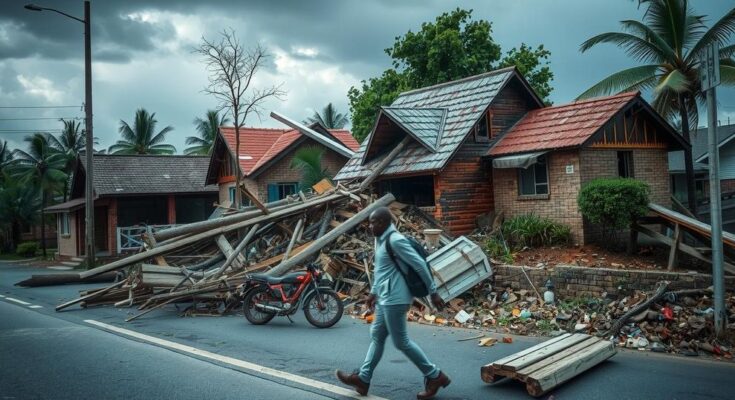Tropical Cyclone Chido led to at least seven deaths in Malawi, affecting over 30,000 others. The storm damaged numerous schools and homes, with notable casualties in several districts. Despite the destruction, relief efforts are in progress, and classes have resumed following the storm’s dissipation.
Tropical Cyclone Chido has tragically resulted in the deaths of at least seven individuals in Malawi while impacting over 30,000 more, according to disaster management officials. The Malawi Department of Disaster Management Affairs reported that the storm caused significant destruction, including the dislodging of roofs from schools, health facilities, and residences. Notably, the hardest-hit regions included Salima, Kasungu, Machinga, Blantyre, and Lilongwe, with various injuries also reported. Chido, which formed northeast of Madagascar, subsequently affected Mozambique and the Comoros archipelago before making its way through Malawi, bringing heavy rains and flooding to numerous districts. Following the storm’s passage, authorities have halted school classes as a safety measure but have since resumed them.
Additionally, the Malawi government is currently collaborating with humanitarian partners to deliver relief supplies to the affected communities while evaluating the situation. Fortunately, the storm has dissipated, but officials remain vigilant for any potential developments originating from the Indian Ocean.
Storm Chido, which formed over the Indian Ocean, made its landfall near Nacala, Mozambique, before proceeding to Malawi. Official reports indicate that beyond the fatalities in Malawi, the storm also caused considerable damage across the neighboring nations, affecting over 174,000 people in Mozambique and approximately 64,000 in the Comoros archipelago. This phenomenon represents the increasing challenges posed by tropical cyclones in the region, necessitating a coordinated response from government and humanitarian organizations to mitigate the impact of such disasters.
In summary, Tropical Cyclone Chido has had a devastating impact on Malawi, claiming lives, causing injuries and significant property damage, while also affecting neighboring countries. As recovery efforts are initiated, with the government and local agencies working to provide assistance to the surviving victims, the lessons learned from this event may galvanize enhancements in disaster preparedness and climate resilience strategies in the future.
Original Source: www.voanews.com




